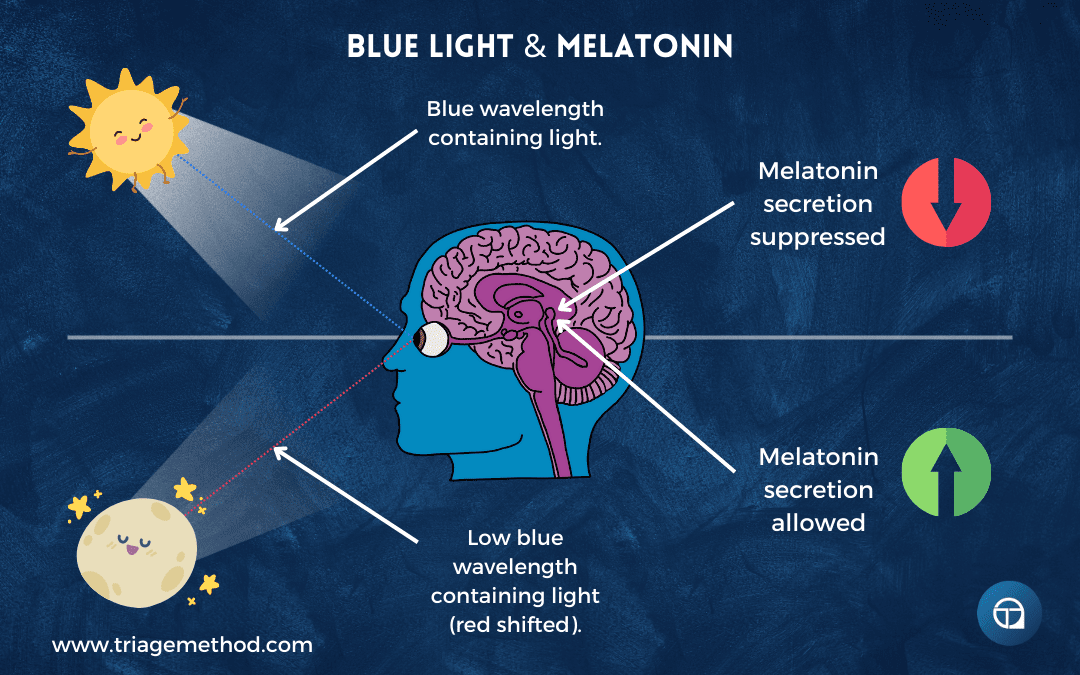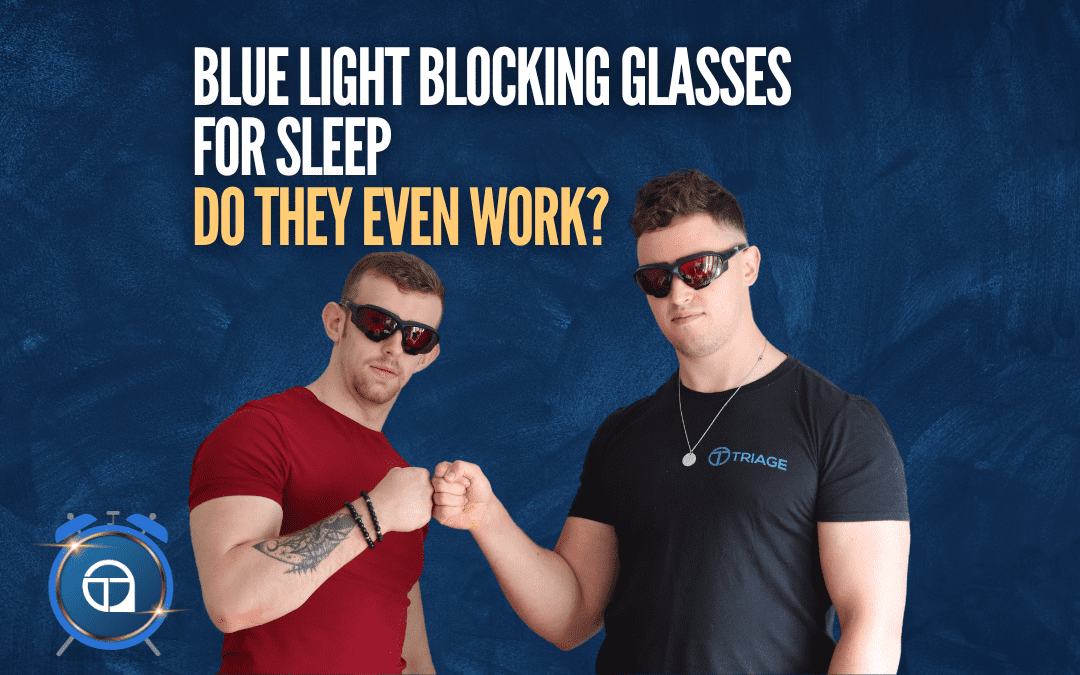Blue light blocking glasses for sleep? Is wearing funky-looking glasses before bed something you should be doing to improve your sleep, or is it all just a passing fad? Well, if you have read our comprehensive article on sleep, you will be aware of some of the rationale behind why we might want to block out blue light before bed. Getting high-quality sleep is something that a lot of people struggle with, and is something we work on improving with our coaching clients very frequently. One of the strategies we have in our coaching toolbox is to manipulate our exposure to blue light, and something we frequently get asked about in relation to this is whether blue light blocking glasses can be useful in helping with this.
In a world driven by digital devices and artificial lighting, getting high-quality sleep has become increasingly challenging. The incessant glow of screens, from smartphones to laptops, disrupts our natural sleep-wake cycles, leaving many of us struggling to fall asleep and stay asleep. Sleep is a fundamental pillar of good health, and its significance cannot be overstated. In recent years, researchers and health enthusiasts alike have turned their attention to the potential benefits of blue light blocking glasses for improving sleep quality.
But what exactly are these blue light blocking glasses, do they even work, and if they do, how do they work their magic on our sleep patterns? Are they truly the solution we’ve been searching for, or just another trend?
Blue Light Blocking Glasses For Sleep
Why Wear Blue Light Blocking Glasses
So you’ve probably seen people around the health and fitness space wearing some of these weird, sort of orange glasses. Now, aside from making you look like Bono or potentially Cyclops out of X-Men, do these glasses have utility? Will they help you to improve your sleep dramatically?
Before we get into it, we need to discuss why people might wear these glasses in the first place. What are the purported benefits to wearing them, and what does the research say in this context?
So, the idea is that certain wavelengths of the light spectrum, namely blue light, send the body a signal through the eyes, that effectively says: “Hey, it’s daytime, time to do daytime processes.” This then has effects on metabolism and effects on physiology, and thus managing your blue light exposure at certain times is important. It’s important to get this daylight exposure for overall sleep quality and overall entrainment of your circadian rhythm and body clocks.

So, the problem occurs if it’s the evening time and it’s getting dark out, and you are being exposed to artificial light. Obviously in this case, if the sun is down you would normally start winding down a bit more for the day, then the exposure to artificial light is potentially continuing to send that “Hey, it’s daytime” signal to your body and your brain, which can inhibit things like melatonin secretion. Melatonin is a sleep hormone, amongst other things, which helps us actually fall asleep and has a role to play in sleep quality. It’s also an antioxidant.
So, if you’re exposing yourself to this blue light spectrum, you’re sending that awake signal. So, does this interfere with your sleep quality? Does it interfere with your ability to fall asleep? Well, yes, it does, pretty consistently. Even in people who get good sleep, this is still affecting them.
The reality is that your brain and your body are not expecting significant amounts of light at that time of the day, and you are obviously artificially supplying that in the form of various devices and overhead lighting. Anything with a screen is going to supply artificial light – laptops, iPads, phones, TV, and also, of course, the actual lighting system that you have where you live. And this can lead to what’s referred to as “iPad insomnia”, where you have difficulty falling asleep. You could be lying in bed, just quite awake, not really feeling sleepy, not really feeling drowsy, maybe not even sleeping as well as you would like to in terms of quality throughout the night.
So, if you can wear blue blockers, as they’re often referred to, and block out some of those disruptive wavelengths of light in the evening time when you’re not supposed to be exposed to them as much, then potentially you set yourself up for having better circadian rhythm alignment, better sleep, and all the benefits that that then brings.
Do Blue Light Blocking Glasses For Sleep Even Work?
Now, if we look at the actual research on these types of glasses in this context of sleep and sleep onset and sleep quality, etc., it is a bit mixed. Some studies, show there to not really be a benefit, whereas some studies, show that there is some sort of benefit. So the research is a bit mixed, even if the mechanism of action makes sense.
Anecdotally, the other members of the Triage team and I do tend to find them to be quite useful, and many of our clients also find benefit in them. And when there’s a situation where the research is quite mixed, how I like to make decisions about this in terms of making recommendations to clients potentially is we look at the actual risk versus reward.
So, there is a lot of potential reward to be had from trying something like blue light blocking glasses out in your evening routine. You could actually achieve better sleep and reduce the frequency of times where you are just lying there, wide awake because you’re stimulated by the blue light exposure that you’re getting in the evening time. And, as I said anecdotally, for myself and the team, and with many of our clients, it does seem to help people get to sleep and sleep better. This is generally in conjunction with other sleep hygiene habits, like we discuss in our comprehensive article on sleep, but there does appear to be some benefit to blue light blocking glasses for sleep improvements.
So, the risks are reasonably minimal in this case. It’s really just the investment in the glasses themselves, which can be significant in some cases. They can cost 50-80 Euro a pair and more than that potentially if you need to get a prescription pair. But other than the financial cost and potentially getting some bogus online clothes orders because you went shopping while wearing these glasses and you couldn’t see the colour properly, there’s not much of a risk involved. Therefore, if someone is okay to pay the money, I’m quite happy to recommend they use them and try them out, in an effort to improve their sleep as part of better sleep hygiene, better bedtime routines, etc.
| Pros of Blue Light Blocking Glasses for Sleep | Cons of Blue Light Blocking Glasses for Sleep |
|---|---|
| Reduces exposure to disruptive blue light in the evening, helping regulate the sleep-wake cycle. | May have a slight yellow or amber tint, which some users may find aesthetically unappealing. |
| Improves sleep onset and overall sleep quality, especially for those who use digital devices before bedtime. | May not completely eliminate all sources of blue light exposure, such as from streetlights or TVs. |
| Potentially reduces digital eye strain, minimising discomfort and fatigue during late-night work or screen use. | May take some time to get used to wearing glasses if you’re not accustomed to them. |
| Can be used alongside other sleep hygiene practices for a comprehensive approach to better sleep. | Quality and effectiveness may vary among different brands and models. |
| Suitable for various age groups, including children and adults, to promote healthier sleep habits. | May not be a standalone solution for severe sleep disorders or chronic insomnia. |
| Offers a non-pharmacological and non-invasive option to improve sleep, making it accessible to a wide range of individuals. | Prescription blue light blocking glasses may be more expensive than non-prescription options. |
| Does not interfere with your sleep environment or require special adjustments like some other sleep aids. | Users with certain eye conditions or sensitivities may need to consult with an optometrist before using them. |
| Can be used by shift workers and those with irregular sleep schedules to minimise disruptions to circadian rhythms. | Users may need to remember to put them on consistently in the evening to maximise their benefits. |
| Provides an affordable and reusable solution for sleep improvement that can be used for an extended period. | It may not produce immediate results, and some users may require time to see noticeable sleep improvements. |
Which Blue Light Blocking Glasses Should You Get?
I know this is going to be your next question, as this is generally the first question we get whenever we discuss any tool or device. So, in terms of which ones should you actually get, well, we don’t have any affiliations here at Triage, so there’s none specifically that I’ll say, “Oh yeah, you should go and get these.” But on a more macro level, we can help point you in the right direction with your purchases.
We have several options for blue blockers, and typically, they range from the more clear lens glasses all the way up to ones that are quite red-orange, quite dark lenses.
Now, the clearer lens ones are more fashionable, arguably. Ultimately, though, if you are just wearing them for a couple of hours before bed, then you are probably not too concerned about that. And the reality is that the darker lens, more orange lens ones are definitely superior in terms of the actual function that they’re trying to perform. They generally block out more blue light, therefore, you’re going to get a stronger effect from them. Ultimately, though, if you’re just going to wear them for a couple of hours before bed, you may as well just go for the ones that are more effective, which are going to be the really dark red or orange ones. You can get ones that are sort of in between, kind of an orange or almost a version of a yellow lens, but the Paleotech brand by Sundown eyewear blue light blocking glasses are the ones that I like. Dean from Triage also likes these, and for any clients that I recommend blue light blocking glasses to, I usually recommend these ones. And they do report that it’s almost like wearing a sedative. They find them to be quite effective, and they relatively consistently improve their sleep onset and overall sleep quality.
However, we have not done extensive testing and analysis of which glasses reduce blue light exposure the most, or which more consistently result in improvements in sleep. Now you may go to another website and search up which brands are best, but unless they are actually testing out their blue light blocking functionality and whether they actually consistently result in sleep improvements, they are just going to tell you to buy the brands that give them the best affiliate/commission rates, rather than what is actually good.
Blue Light Blocking Glasses For Sleep Conclusion
We coach a lot of clients, and many of them need help to improve their sleep. There are many strategies we can use to improve sleep, but once the foundational sleep hygiene habits are in place, many people do find that blue light blocking glasses can be quite beneficial for helping them further improve their sleep (especially their ability to get to sleep).
Throughout this article, we’ve discussed the science behind the sleep-disrupting effects of blue light and delved into the potential benefits of blue light blocking glasses. However, it’s important to remember that blue light blocking glasses are really just one piece of the larger puzzle. Achieving optimal sleep health also involves maintaining a consistent sleep schedule, creating a sleep-friendly environment, and integrating the foundational sleep hygiene habits consistently into your life. Getting great sleep doesn’t need to be something reserved for the lucky few, and in reality, most people can dramatically improve their sleep with a bit of focused work. Blue light blocking glasses can be part of a larger strategy to improve your sleep, but you do still have to focus on the basics.
If this content is something that you resonate with, that you struggle with, as it is for a lot of our clients, then we might be able to help you on a one-to-one basis through our online coaching services. With coaching, we can look at the exact barriers you’re coming up against and see how we can overcome those barriers for you.
We do also cover sleep extensively on our nutrition coaching certification course, if you are interested in learning more about actually coaching someone to better sleep. If you just want to learn more about all things health and fitness, then feel free to explore our free content and subscribe to our email newsletter. If you prefer visual content, then subscribe to our YouTube channel and Instagram for more content!
Blue Light Blocking Glasses FAQs
Whenever we cover something specific like this, we tend to get a variety of questions, so I am just going to include a few frequently asked questions we have received over the years about using blue light blocking glasses for sleep. If you do have further questions, please don’t hesitate to reach out to us on social media!
Blue light blocking glasses are specially designed glasses that help to filter out, or at least reduce the blue wavelengths of light emitted from digital screens and artificial lighting, which may disrupt melatonin synthesis and thus sleep. They typically have special coatings or filters that block out a portion of blue light wavelengths, and generally, they will be coloured orange or red, although some are clearer (although the clearer ones may not be as effective).
The research is actually quite mixed on this, but anecdotally, many people do find that they are effective. If nothing else, they can serve as an anchoring habit that ensures you engage in other good sleep hygiene practices.
Anyone who wants to improve their sleep really. However, individuals who are exposed to digital screens and/or artificial light in the lead up to sleep are more likely to see a clear benefit from wearing blue light blocking glasses in the lead up to sleep.
You certainly can, but this generally wouldn’t be advised. You do still want to be exposed to blue wavelengths of light during the day, as this allows you to actually entrain your circadian rhythm to the natural day. In fact, wearing blue light blocking glasses earlier in the day, may actually make your sleep worse, because that is when you want the blue light to be sending the signal to your brain to be awake. So wearing blue light blocking glasses earlier in the day generally isn’t advised, although some people do find that wearing the clearer, rather than the deeply tinted, blue light blocking glasses is beneficial for reducing eye strain and fatigue when they are required to be looking at digital screens for extended periods of time (i.e. office work).
Yes, you can get prescription blue light blocking glasses from an optometrist or specific eyewear retailers.
No, you can purchase non-prescription blue light blocking glasses without a prescription. However, if you need corrective lenses, you can get them with a prescription.
Generally, there seem to be no significant side effects. Some users may notice a slight colour shift due to the tint, but this is usually not bothersome. Some people do find wearing them makes them quite sleepy, so naturally enough, if this is the case for you, it wouldn’t be wise to try to drive while wearing them (or engage in any other habits that could negatively impact your health if performed while sleepy).
Generally, you want to start wearing blue light blocking glasses around 1-2 hours before you intend to go to sleep, if you want to really optimise your sleep. Some people find that they do make them quite sleepy, relatively quickly, so in these cases, you may only need to wear them 30-45 minutes before you intend to go to sleep.
You can see some more immediate benefits by wearing blue light blocking glasses, and they may help you to get to sleep faster on the day you wear them. However, if you really want to get the maximum benefit, wearing them as part of your sleep hygiene habits consistently will allow you to really entrain your circadian rhythm to the sleep schedule you desire.
Blue light blocking glasses generally aren’t going to be the biggest lever with regards to improving sleep, and they should be worn in conjunction with a focus on generally good sleep hygiene practices. They can generally be used in combination with other sleep strategies, but as with everything, it depends on the exact specifics of the situation.
References and Further Reading
Lawrenson JG, Hull CC, Downie LE. The effect of blue-light blocking spectacle lenses on visual performance, macular health and the sleep-wake cycle: a systematic review of the literature. Ophthalmic Physiol Opt. 2017;37(6):644-654. doi:10.1111/opo.12406 https://pubmed.ncbi.nlm.nih.gov/29044670/
Vagge A, Ferro Desideri L, Del Noce C, Di Mola I, Sindaco D, Traverso CE. Blue light filtering ophthalmic lenses: A systematic review. Semin Ophthalmol. 2021;36(7):541-548. doi:10.1080/08820538.2021.1900283 https://pubmed.ncbi.nlm.nih.gov/33734926/
Bigalke JA, Greenlund IM, Nicevski JR, Carter JR. Effect of evening blue light blocking glasses on subjective and objective sleep in healthy adults: A randomized control trial. Sleep Health. 2021;7(4):485-490. doi:10.1016/j.sleh.2021.02.004 https://pubmed.ncbi.nlm.nih.gov/33707105/
Hester L, Dang D, Barker CJ, et al. Evening wear of blue-blocking glasses for sleep and mood disorders: a systematic review. Chronobiol Int. 2021;38(10):1375-1383. doi:10.1080/07420528.2021.1930029 https://pubmed.ncbi.nlm.nih.gov/34030534/
Shechter A, Kim EW, St-Onge MP, Westwood AJ. Blocking nocturnal blue light for insomnia: A randomized controlled trial. J Psychiatr Res. 2018;96:196-202. doi:10.1016/j.jpsychires.2017.10.015 https://www.ncbi.nlm.nih.gov/pmc/articles/PMC5703049/




